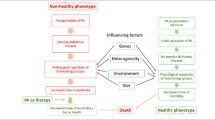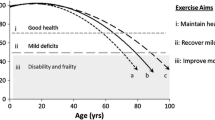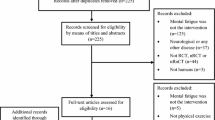Abstract
Background
Everyday functioning becomes a challenge with aging, particularly among frail oldest-old adults. Several factors have been identified as influencing everyday activities realization, including physical and cognitive functioning. However, the influence of cognitive resources as a compensatory factor in the context of physical frailty deserves further consideration.
Aims
This study aims to investigate in older adults physically frail the possible compensatory role of cognitive resources to perform everyday tasks.
Methods
Two groups of community-dwelling old participants (n = 26 per group) matched for their age and cognitive resources, have been drawn according to their level of physical functioning. Two measures of everyday functioning have been assessed: one self-reported by the participant (the IADL scale) and one performance-based measure (the TIADL tasks).
Results
Participants performed equally the TIADL tasks irrespective of their physical condition. Contrariwise, participants with low physical functioning reported more everyday difficulties than their counterparts with a high level of physical functioning. Additionally, regressions analyses revealed differential influence of cognitive resources on performance and reported measures of everyday functioning.
Discussion
Our data suggests that cognitive resources are more strongly involved in the performance-based IADL measure in situation of physical frailty. Additionally, for participants with low physical functioning, lower cognitive resources are associated with more perceived difficulties in everyday life.
Conclusion
These results highlight the compensatory role of cognitive resources in physically frail older adults, and suggest that an overestimation of everyday difficulties compared to performance on IADL tasks is an early indicator of physical decline and cognitive compensation.
Similar content being viewed by others
Data availability
The data that support the findings of this study are available from the corresponding author upon reasonable request.
References
Diehl M (1998) Everyday competence in later life: current status and future directions. Gerontologist 38:422–433. https://doi.org/10.1093/geront/38.4.422
Heyl V, Wahl H-W (2012) Managing daily life with age-related sensory loss: cognitive resources gain in importance. Psychol Aging 27:510–521. https://doi.org/10.1037/a0025471
Lawton MP, Brody EM (1969) Assessment of older people: self-maintaining and instrumental activities of daily living. Gerontologist 9:179–186
Gold DA (2012) An examination of instrumental activities of daily living assessment in older adults and mild cognitive impairment. J Clin Exp Neuropsychol 34:11–34. https://doi.org/10.1080/13803395.2011.614598
Lawton MP, Moss M, Fulcomer M, Kleban MH (1982) A research and service oriented multilevel assessment instrument. J Gerontol 37:91–99. https://doi.org/10.1093/geronj/37.1.91
Ware JE, Sherbourne CD (1992) The MOS 36-Item Short-Form Health Survey (SF-36): I. conceptual framework and item selection. Med Care 30:473–483
Fillenbaum GG (2013) Multidimensional functional assessment of older adults : The Duke older Americans resources and services procedures. Psychology Press
Owsley C, Sloane M, McGwin G Jr, Ball K (2002) Timed instrumental activities of daily living tasks: relationship to cognitive function and everyday performance assessments in older adults. Gerontology 48:254–265. https://doi.org/10.1159/000058360
Moore DJ, Palmer BW, Patterson TL, Jeste DV (2007) A review of performance-based measures of functional living skills. J Psychiatr Res 41:97–118. https://doi.org/10.1016/j.jpsychires.2005.10.008
Suchy Y, Kraybill ML, Franchow E (2011) Instrumental activities of daily living among community-dwelling older adults: discrepancies between self-report and performance are mediated by cognitive reserve. J Clin Exp Neuropsychol 33:92–100. https://doi.org/10.1080/13803395.2010.493148
Burton CL, Strauss E, Hultsch DF, Hunter MA (2006) Cognitive functioning and everyday problem solving in older adults. Clin Neuropsychol 20:432–452. https://doi.org/10.1080/13854040590967063
Bravell ME, Zarit SH, Johansson B (2011) Self-reported activities of daily living and performance-based functional ability: a study of congruence among the oldest old. Eur J Ageing 8:199–209. https://doi.org/10.1007/s10433-011-0192-6
Pruchno RA, Wilson-Genderson M (2015) A longitudinal examination of the effects of early influences and midlife characteristics on successful aging. J Gerontol B Psychol Sci Soc Sci 70:850–859. https://doi.org/10.1093/geronb/gbu046
Mejía ST, Ryan LH, Gonzalez R, Smith J (2017) Successful aging as the intersection of individual resources, age, environment, and experiences of well-being in daily activities. J Gerontol B Psychol Sci Soc Sci 72:279–289. https://doi.org/10.1093/geronb/gbw148
Hering A, Kliegel M, Rendell PG et al (2018) Prospective memory is a key predictor of functional independence in older adults. J Int Neuropsychol Soc JINS 24:640–645. https://doi.org/10.1017/S1355617718000152
Gross AL, Rebok GW, Unverzagt FW et al (2011) Cognitive predictors of everyday functioning in older adults: results from the ACTIVE Cognitive Intervention Trial. J Gerontol Ser B 66B:557–566. https://doi.org/10.1093/geronb/gbr033
Wechsler D (2008) Wechsler adult intelligence scale - Fourth Edition (WAIS-IV). 498
Dubois B, Slachevsky A, Litvan I, Pillon B (2000) The FAB: a frontal assessment battery at bedside. Neurology 55:1621. https://doi.org/10.1212/WNL.55.11.1621
Jurica PJ, Leitten CL, Mattis S (1988) DRS-2 dementia rating scale-2: professional manual. Psychological Assessment Resources
Park H, Jang I-Y, Lee HY et al (2019) Screening value of social frailty and its association with physical frailty and disability in community-dwelling older Koreans: aging study of PyeongChang rural area. Int J Environ Res Public Health. https://doi.org/10.3390/ijerph16162809
Fried LP, Tangen CM, Walston J et al (2001) Frailty in older adults: evidence for a phenotype. J Gerontol Ser A 56:M146–M157. https://doi.org/10.1093/gerona/56.3.M146
Shimada H, Makizako H, Doi T et al (2015) Incidence of disability in frail older persons with or without slow walking speed. J Am Med Dir Assoc 16:690–696. https://doi.org/10.1016/j.jamda.2015.03.019
Makino K, Ihira H, Mizumoto A et al (2018) Structural analysis of impact of physical, cognitive and social status on the incidence of disability in community-dwelling people aged ≥ 75 years. Geriatr Gerontol Int 18:1614–1619. https://doi.org/10.1111/ggi.13539
Seidel D, Brayne C, Jagger C (2011) Limitations in physical functioning among older people as a predictor of subsequent disability in instrumental activities of daily living. Age Ageing 40:463–469. https://doi.org/10.1093/ageing/afr054
Poli S, Cella A, Puntoni M et al (2017) Frailty is associated with socioeconomic and lifestyle factors in community-dwelling older subjects. Aging Clin Exp Res 29:721–728. https://doi.org/10.1007/s40520-016-0623-5
Owsley C, Allman R, Gossman M et al (2018) Mobility impairment and its consequences in the elderly. In: Clair JM, Almman R (eds) The gerontological prism: developing interdisciplinary bridges: developing interdisciplinary bridges. CRC Press, Boca Raton
Li KZH, Lindenberger U, Freund AM, Baltes PB (2001) Walking while memorizing: age-related differences in compensatory behavior. Psychol Sci 12:230–237. https://doi.org/10.1111/1467-9280.00341
Poole VN, Lo O-Y, Wooten T et al (2019) Motor-cognitive neural network communication underlies walking speed in community-dwelling older adults. Front Aging Neurosci. https://doi.org/10.3389/fnagi.2019.00159
Wollesen B, Wanstrath M, van Schooten KS, Delbaere K (2019) A taxonomy of cognitive tasks to evaluate cognitive-motor interference on spatiotemoporal gait parameters in older people: a systematic review and meta-analysis. Eur Rev Aging Phys Act 16:12. https://doi.org/10.1186/s11556-019-0218-1
Taillade M, Sauzéon H, Arvind Pala P et al (2013) Age-related wayfinding differences in real large-scale environments: detrimental motor control effects during spatial learning are mediated by executive decline? PLoS One 8:e67193. https://doi.org/10.1371/journal.pone.0067193
Baltes PB, Baltes MM (1993) Psychological perspectives on successful aging: the model of selective optimization with compensation. Successful aging: perspectives from the behavioral sciences. Cambridge University Press, Cambridge, pp 1–35
Zhang W, Radhakrishnan K (2018) Evidence on selection, optimization, and compensation strategies to optimize aging with multiple chronic conditions: a literature review. Geriatr Nurs N Y N 39:534–542. https://doi.org/10.1016/j.gerinurse.2018.02.013
Guralnik JM, Simonsick EM, Ferrucci L et al (1994) A short physical performance battery assessing lower extremity function: association with self-reported disability and prediction of mortality and nursing home admission. J Gerontol 49:M85–M94. https://doi.org/10.1093/geronj/49.2.M85
Bruyère O, Buckinx F, Beaudart C et al (2017) How clinical practitioners assess frailty in their daily practice: an international survey. Aging Clin Exp Res 29:905–912. https://doi.org/10.1007/s40520-017-0806-8
Vellas B, Guigoz Y, Garry PJ et al (1999) The mini nutritional assessment (MNA) and its use in grading the nutritional state of elderly patients. Nutrition 15:116–122. https://doi.org/10.1016/S0899-9007(98)00171-3
Folstein MF, Folstein SE, McHugh PR (1975) Mini-mental state. J Psychiatr Res 12:189–198. https://doi.org/10.1016/0022-3956(75)90026-6
McNair DM, Kahn RJ, Crook SFT, Bartus R (1983) The cognitive difficulties scale. Assess Geriatr Psychopharmacol 137:143
Wettstein M, Schilling OK, Wahl HW (2016) “Still feeling healthy after all these years”: the paradox of subjective stability versus objective decline in very old adults’ health and functioning across five years. Psychol Aging 31:815–830. https://doi.org/10.1037/pag0000137
Fors S, Thorslund M, Parker MG (2006) Do actions speak louder than words? Self-assessed and performance-based measures of physical and visual function among old people. Eur J Ageing 3:15–21. https://doi.org/10.1007/s10433-006-0021-5
Spitzer S, Weber D (2019) Who is telling the truth? Biases in self-reported physical and cognitive health status of older Europeans. IIASA Work Pap WP-19-002
Acknowledgements
The authors are very grateful to the services of UDCCAS Gironde that allowed them access to the elderly.
Funding
This work was supported by the National French Institute of Informatics and Mathematics (Inria), the Public funds Conseil Régional d’Aquitaine, CNSA (Caisse Nationale de la Solidarité pour l’Autonomie), Conseil Départemental de la Gironde, and CARSAT Aquitaine (Caisse d’Assurance Retraite et de la Santé au Travail) and the Fondation pour la Recherche Médicale (Grant number: DOC20161136217; PI: Sauzéon).
Author information
Authors and Affiliations
Corresponding author
Ethics declarations
Conflict of interest
On behalf of all authors, the corresponding author states that there is no conflict of interest.
Statement of human and animal rights
According to Helsinki declaration, approval was sought and obtained from the ethics committee of the Bordeaux University.
Informed consent
All participants provided a written consent form prior to participation in the study.
Additional information
Publisher's Note
Springer Nature remains neutral with regard to jurisdictional claims in published maps and institutional affiliations.
Rights and permissions
About this article
Cite this article
Dupuy, L., N’Kaoua, B., Dehail, P. et al. Role of cognitive resources on everyday functioning among oldest-old physically frail. Aging Clin Exp Res 32, 2021–2029 (2020). https://doi.org/10.1007/s40520-019-01384-3
Received:
Accepted:
Published:
Issue Date:
DOI: https://doi.org/10.1007/s40520-019-01384-3




